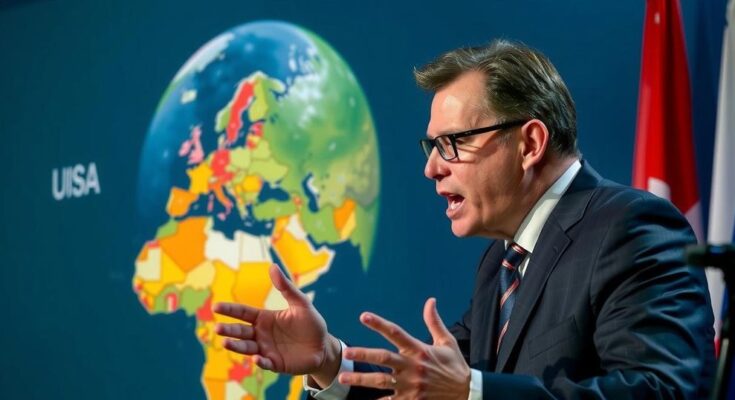At COP29 in Baku, AOSIS dramatically walked out of climate talks due to frustrations over insufficient financial commitments from developed nations for climate action. The event highlighted the vulnerability of small island nations and their demands for increased aid and action against climate change. Ultimately, AOSIS returned to the table but expressed disappointment over inadequate agreements related to climate financing.
At the recent COP29 climate talks in Baku, Azerbaijan, the Alliance of Small Island States (AOSIS) staged a dramatic walkout, indicating their profound frustration over negotiations concerning climate finance. Michai Robertson, AOSIS’ finance negotiator, articulated the group’s readiness to abandon the summit altogether, citing the dismissive attitudes of other nations regarding the substantial financial aid essential for addressing climate change challenges. The walkout, which transpired during discussions that had exceeded time limits by 19 hours, underscores the escalating tensions and power dynamics present within the negotiations. Robertson emphasized that such actions signify AOSIS’s assertion of its significance in the climate dialogue, reinforcing their stance against being marginalized in discussions that profoundly affect their countries.
During the negotiations, AOSIS and the Least Developed Countries’ group expressed their need for increased funding to counteract the urgent impacts of climate change, actionable measures against fossil fuel emissions, and the overarching goal of limiting global temperature increases to 1.5°C. This goal remains crucial for the survival of numerous island nations threatened by rising sea levels and environmental degradation. Although AOSIS eventually returned to the negotiating table, they maintained that the final commitments were insufficient, receiving assured funding of $300 billion annually until 2035, which fell short of their $500 billion target. Moreover, they conveyed disappointment regarding uncertain commitments regarding $1.3 trillion required from public and private sectors for developing nations.
Robertson reflected on the necessity of addressing fundamental geopolitical issues in future talks, specifically the upcoming COP30 in Brazil, stating, “it’s really sad that it took us walking out to get that.” His remarks underscore the challenges faced by smaller nations within the framework of the United Nations climate talks, indicating a need for systemic changes to ensure their voices resonate in global discussions. AOSIS represents 43 vulnerable nations whose survival hinges on adequate climate action and funding, highlighting the urgent need for all parties to engage seriously with their actionable demands in international climate policy discussions.
The ongoing dialogue surrounding climate change at international forums such as the COP28 and COP29 emphasizes the complex dynamics at play, particularly for vulnerable nations such as those represented by AOSIS. These nations are acutely impacted by climate changes, such as rising sea levels and extreme weather events, which threaten their very existence. Their calls for increased funding to mitigate these risks and enhance resilience are often met with political barriers that reflect larger geopolitical concerns. The recent walkout by AOSIS at COP29, a significant moment in negotiation history, illustrates the urgent need for substantive commitments from wealthier nations concerning climate finance, and it sets a tone of unity among smaller island nations and organizations advocating for climate justice.
The events at COP29 have spotlighted the urgent need for the global community to address the specific requirements of small island States and other vulnerable nations within climate negotiations. The walkout by AOSIS signifies both a profound disappointment with current financial promises and a necessary assertion of their importance in global discussions. As the dialogue continues toward future summits, it remains essential that the voices of these nations are not only acknowledged but that their calls for equitable financial support and tangible climate actions are urgently met.
Original Source: www.bbc.com




